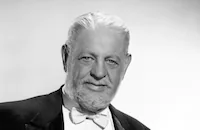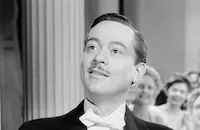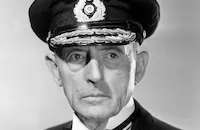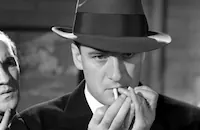Flight from Destiny

Brief Synopsis
Cast & Crew
Vincent Sherman
Geraldine Fitzgerald
Thomas Mitchell
Jeffrey Lynn
James Stephenson
Mona Maris
Film Details
Technical Specs

Synopsis
When philosophy professor Henry Todhunter learns he has only six months to live, he polls the members of the University Club to learn what they would do in a similar situation. Each man has a different answer, but Henry's interest is piqued when one suggests murdering a person who is a menace to society. Henry discusses the idea with his doctor, Lawrence Stevens. Although Larry argues that no man is entitled to act as judge and jury, Henry believes that a man facing death possesses the immortality to act without self interest for the benefit of society as a whole. Henry's friend, Betty Farroway, who is waiting for him when he returns home, is concerned because her husband Michael, an artist, is acting strangely. Henry agrees to talk to Michael and accompanies Betty home in a taxi. Stuck in traffic, Henry and Betty see Michael kiss Ketti Moret in front of her gallery. The next day, Henry asks Ketti to stop interfering with Michael's life, and she replies that her only interest is in his work. Later Michael is hit by a car and while semi-conscious begs Betty to destroy a painting. Intrigued, Henry and Betty explore Michael's studio, where they find a painting done in the style of an ancient painter. Henry realizes that Michael has been forging paintings for Ketti, and believing that in Ketti he has met a truly evil person, investigates her life. He learns that no one, not even her abandoned child, her mother, or her former husband cares if Ketti lives or dies. Michael admits painting the fakes and Henry suggests that he ask Ketti to reveal the real painter to the person who bought the counterfeit painting. When she refuses, Michael threatens to kill her and is overheard by Ketti's maid. After Michael leaves, Henry emerges from his hiding place in Ketti's apartment and kills the unremorseful woman. Henry's plans go awry when Michael is arrested for the murder. Henry immediately confesses, but at first, no one believes his story. Eventually, he convinces Larry to testify to their conversation on the subject of murder, and is soon convicted and sentenced to death. Henry plans to exert himself enough to cause a fatal heart attack and thus avoid the electric chair, but when one of his former students is brought to jail after having been inspired to murder by Henry's example, he realizes the damage that he has done and accepts his punishment as just.

Director

Vincent Sherman
Cast

Geraldine Fitzgerald

Thomas Mitchell

Jeffrey Lynn

James Stephenson

Mona Maris

Jonathan Hale
David Bruce

Thurston Hall
Mary Gordon

John Eldredge

Hardie Albright
William Forrest
Weldon Heyburn
Dewolf Hopper
Alexander Lockwood

Frank Reicher

Willie Best
Libby Taylor
Romaine Callender
Ed Gargan
Sol Gorss

Elliott Sullivan
Rafael Storm
Ed Stanley
Ann Edmonds
Manart Kippen
Inez Palange
Alden Chase
Rolla Stewart

Alexis Smith
Richard Kipling
Peter Ashley

John Hamilton
Robert Homans
Eddy Chandler

Bess Flowers
Evelyn Mulhall

Lucia Carroll
George Campeau
Wedgwood Nowell
Crew
Elmer Decker
Leo F. Forbstein
Bryan Foy
Damon Giffard
Edmund Grainger
Esdras Hartley
Ray Heindorf
Charles Kenyon
Charles Lang
Thomas Richards
H. Roemheld
Robert Rossen
Barry Trivers
James Van Trees
Perc Westmore

Film Details
Technical Specs

Articles
Flight from Destiny -
By Richard Harland Smith

Flight from Destiny -
Geraldine Fitzgerald (1913-2005)
Born in Dublin on November 24, 1913, Fitzgerald was educated for a time in a convent school in London. Back in her native Dublin, she happily accompanied her aunt, the Irish actress Shelah Richards, to a theater one afternoon when the director mistook her for an actress, and instructed her "to go backstage and change." An inauspicious start, but it gave her the acting bug. She made her stage debut in 1932 in Dublin's Gate Theater and later appeared in a few forgettable British films: Open All Night (1934), The Ace of Spades, Three Witnesses (both 1935). She made the trip across the Atlantic in 1938 to act with Orson Welles and his Mercury Theater, but agents from Warner Bros. quickly signed her and she was soon off to Hollywood.
She made her film debut in 1939 supporting Bette Davis in Dark Victory, but it was her performance in a second film later in the year that proved to be the most memorable of her career - the role of Isabella Linton in Wuthering Heights. She earned an Oscar® nomination for her turn and stardom should have been around the corner, but Fitzgerald's feuding with studio head Jack Warner (he refused to let her return to the New York stage and she would refuse parts that she thought were inferior) led to some lengthy suspensions of unemployment. Irregardless, Fitzgerald still had some shining moments at Warner Bros. the heady melodrama The Gay Sisters (1942); the superb espionage thriller Watch on the Rhine (1943); Robert Siodmak's terrific, noirish thriller The Strange Affair of Uncle Harry (1945); and a tough crime drama where she played opposite John Garfield Nobody Lives Forever (1946).
Fitzgerald returned to New York by the '50s, and found much work in many of the live television dramas that were so popular in the day: Goodyear Television Playhouse, Lux Video Theatre, Studio One, Schlitz Playhouse of Stars; and even some taped television shows: Naked City, Alfred Hitchcock Presents in between her stage demands.
She did return to the screen by the mid-'60s and proved herself a fine character actress in films like The Pawnbroker (1965); Rachel, Rachel (1968); Harry and Tonto (1974); a wonderfully memorable comic turn as Dudley Moore's feisty grandmother in Arthur (1981); and yet another noteworthy performance as Rose Kennedy in the acclaimed mini-series Kennedy (1983). She also appeared in a few television programs: St. Elswhere, Cagney & Lacey, and The Golden Girls before ill-health forced her to retire by the early '90s. Among the relatives that survive her are her son, director Michael Lindsay-Hogg (Brideshead Revisited; a daughter, Susan Scheftel; and her great-niece, the English actress Tara Fitzgerald.
by Michael "Mitch" Toole
Geraldine Fitzgerald (1913-2005)
Quotes
Trivia
Notes
The film's working titles were Invitation to a Murder and Trial and Error.















